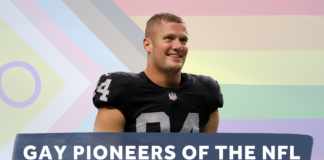
em { display: contents !important; } label em { display: none !important; } .photo { width: 100%; max-width: 50rem } a.fr-file { color: #0274b7 !important; }
There was a parade over the weekend.
I’d forgotten about it, though earlier in the week we had talked about maybe taking our dogs down to watch. They love parades and street fairs and the like; they like being outdoors among people in good moods. Maybe they believe all the fuss is about them.
But they have gotten older, and walks of more than a few blocks can wear them out. And life is full of errands and opportunities, and so I was coming back from the golf course on Saturday when I realized the Broadway Bridge was closed to traffic and remembered why. I turned right instead of left and caught a glimpse of the colorfully attired crowd and made it home maybe five minutes later than usual.
So we missed the Gay Pride parade.
I’m sorry about that. For I remember a time when gay co-workers lived in fear of people discovering their secret. I suspect one committed suicide because he couldn’t face living as a gay man in the society we have built; I remember another friend who lived after swallowing a bottle of pills.
“I don’t want to be gay,” he wrote in his note.
I didn’t know my namesake uncle was gay until he died from HIV in 1986. I guess he didn’t want me to know. I guess he was ashamed. Had he been born a generation later, maybe he would not have felt that way. Or maybe he would have.
There are still, and always will be, bigots in the world. We are animals, after all, driven more by fears than aspirations. There will always be people who stand before school boards to drone on about what they can only apprehend as “wickedness.”
Here in the 21st century, we still talk about banning books. Same as it ever was.
It feels good to belong to a tribe, to have an enemy upon whom we can safely heap invective. What’s really sad and boring about our politics is how easy it is to both split us into factions and then to impose an orthodoxy of thought–which is really a kind of non-thought–within these blocs.
Cynical people have figured out how to exploit our loneliness, our need to belong, to sell us products and shrink-wrapped articles of faith to absolve us of any critical thinking. They make us feel good by celebrating our ignorance as a virtue.
Homosexuality does not respect these artificial constructs; belonging to the Westboro Baptist Church does not immunize a couple from having a gay child. No orthodoxy of love can be imposed; you can only suppress action, not desire. And suppression might curdle into self-hate or worse. But you will not stamp out desire any more than you can stamp out left-handedness. You can only create pain.
I think about a high school kid who once worked for me when I had people working for me. He had a Nikon F-3 and knew how to run film, which were qualifications enough to get him hired as a photographer on a semi-weekly newspaper.
It turned out he had an eye and aspirations to make more of those grip and grin shots of community leaders than we could use; he wanted his camera to reveal something about the smiling guys in sports coats whose businesses had exceeded their United Way goals or delivered a four-figure check to Easter Seal.
He tried their patience, working slowly and shooting off a roll when one or two shots would probably suffice. He was always fiddling with apertures and filters, always looking to inject an element of what he couldn’t bring himself to call “art” into the proceedings.
I liked him in the offhand way that one might like someone else’s puppy. He seemed sweet, a little lost perhaps. But with more ambition and hope than a lot of the kids that lived in that east Texas town. He wanted out and I thought that was a good sign; it was a grim little chicken town without a movie theater. Most of the kids got married right out of high school and settled down blocks from their parents’ houses, sometimes in a trailer out back.
This kid figured to get away as soon as he could scrape together the money for a bus ticket to Dallas or Houston. I admired this about him, I might even have encouraged him a bit. But maybe that is only the way I choose to remember it.
We knew he was gay before he knew it himself. He was thin, with a soft country lisp, and you could tell he thought himself more worldly than his classmates, which irritated them. He dyed his hair blue-black and talked a lot about a girlfriend who lived a few towns over and planned to go to Baylor in the fall.
I was his boss, not his friend or mentor. I don’t pretend to have any insight beyond what I saw of him in the office. He came in and did his job, and his photos were serviceable. I tried to get him a small raise, and when it came through he left a nice note in my mailbox, along with a photo he had taken of me at my desk late one evening when I didn’t realize he was there.
One evening he drove his mother’s car to Shreveport, to a bar someone told him about. Not the sort of kid to frequent bars, I guess he didn’t know how to comport himself in the company of drinking men. Anyway, he went to the wrong bar. They beat him up and took his money and camera.
The police rolled their eyes. Shreveport was one of the country’s murder capitals at that time.
I went to see him in the hospital. His eyes were swollen black, his nose and arm broken. He’d been burned with a cigarette, his hair and eyebrows singed with a lighter.
I don’t know how scared you have to be to beat someone like that.
But people who do that have worked out some calculus of absolution in their minds. Haters believe in their reasons; they have faith in their hate. They think it justified, righteous.
Crimes are not made more heinous by the poison thoughts that course through ignorant, terrified–and hence dangerous–little minds. That doesn’t mean that ignorance shouldn’t be attacked, or called out.
I’m sorry I missed the Gay Pride parade. But I am glad that these days a Gay Pride parade in Arkansas can go off with so little drama that it can completely slip my mind.
. . .
Last week, I mistakenly referred to the coach of the 1958 New York Giants as Jim Lee. His full name was Jim Lee Howell. I knew that but for some reason mistyped it. What I didn’t know was that he was a native of Lonoke. Thanks to the dozens of readers who gently informed me.
Philip Martin is a columnist and critic for the Arkansas Democrat-Gazette. Email him at [email protected]







